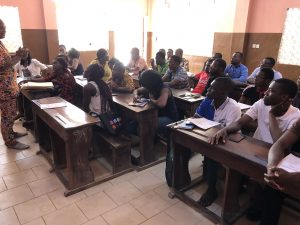Abomey-Calavi (Benin), January 25 to February 2, 2020
Project Report by Thierry THIÉBAUT
IFCM Vice-President, A Coeur Joie International President
Participating organizations:
- Benin « Harmonie Cantat » Federation
- À Cœur Joie International
- International Choral Music Federation
- Conductors Without Borders (CWB)
- French Institute of Benin (French Embassy)
INTRODUCTION
This second training course picked up where the one held in September 2019 left off. Thanks to the implementation of better marketing and communications carried out by The Marketing Heaven, we were able to increase the number of participating choir directors and singers, who were organized into choirs for the duration of the course. Around a dozen choirs sent some of their members.
It is difficult for choir directors to free themselves from professional duties during the work-week. For that reason, this training course took place over a period of ten days, including two weekends, which facilitated their participation.
This schedule also allowed us to meet again with the Collaborating Adviser for Cultural Action – who also serves as director of the French Institute – who confirmed the possibility of establishing a four-part agreement between the Harmonie Cantat Federation, the French Institute of Benin, A Cœur Joie International and IFCM. The French Institute has set aside 3000 € in its 2020 budget for the purpose of such professional development.

PROCEEDINGS
The training took place in a school in the Togoudo de Abomey-Calavi (Cotonou) neighborhood, a location chosen to be convenient for participants.
As in September 2019, three modules were offered:
- Voice training
- Choir director training
- Repertoire work with the training course choirs
Emphasis was placed on choir direction techniques, with additional time set aside for directors-in-training to work with session choirs.
Every choir rehearsal period was preceded by one hour of vocal training (relaxation, breathing, resonators, range). It was possible to work individually with choir members throughout the training course. Specific aspects of choir direction that were introduced included preparation, breathing, setting and keeping the beat, cut-offs. We were able to start working on independence of the hands.
After sight-reading through the repertoire, trainees were asked to choose a piece they wanted to direct with their choir. It is important to point out that choir diretors sometimes gravitate towards polyphonic pieces they find pleasing but which require the use of techniques they have not yet sufficiently mastered. Nonetheless, all trainee choir directors present were able to direct their choir by the end of the course.
The problem of sight-reading remains significant mainly for singers, who often learn music by heart through repetition of their choir director’s example. We provided a collection of working scores to singers (and to trainee directors, of course) to encourage them to improve their sight-reading. Scores are generally not available to choirs, but increasingly one finds singers scanning the director’s score with their telephone in order to make progress in sight-reading.
A pedagogical manual (handbook) was distributed at the end of the course to all choir directors-in-training. It included, of course, chapters that had not yet been taught but which provide motivation for participants to continue their training.
The consistency of directors’ participation was relatively good. Of 18 trainees participating, we were able to award diplomas to 13 of them. The discrepancy stems from the fact that, as agreed upon with Serge N’Tcha, program organizer and president of the Federation, trainees who missed more than two sessions were not eligible to receive a diploma. The same rule applied to singers. It had been made clear to the trainee choir directors that their presence was indispensable at the voice training and repertoire work periods.
At the end of the training course, we visited three choirs during rehearsals directed by participating directors-in-training. This allowed us to observe the trainees in situations where they were already familiar with the singers being directed.
OUTCOMES
We had the impression during this course that participants’ motivation had increased since the first session. A rhythm of two one-week sessions annually should be maintained to ensure thate progress continues to be made.
It must be noted that Serge N’tcha already possesses solid musical credentials, including education in harmony. This should allow him to coordinate and lead local review sessions as well as advanced choir direction and music theory classes.
We feel it is important to follow the director-trainees’ progress after each training week ends.
Some directors are interested in standardization. We have thus also thought about developing training modules that could be offered to others who are interested in learning the essential rules of harmony and modulation.
Indeed, we observed that in local repertoires, harmonies are very often constructed on perfect successive chords.
The next training course is planned for September or October of this year. It will receive partial funding from the French Institute, as was confirmed during our meeting at the French Embassy.
Translated by Anita Shaperd, USA


